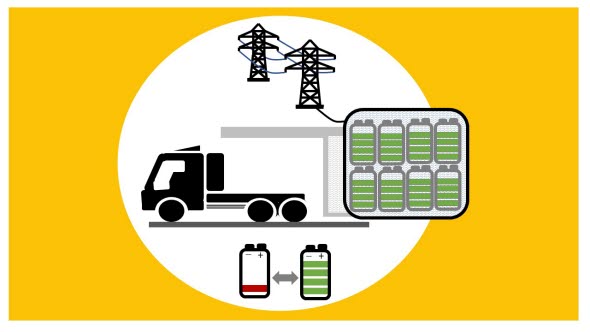New project investigates battery swapping for heavy duty vehicles

In a new research project, the Swedish National Road and Transport Research Institute (VTI), together with Linköping University and a group of experts, will examine whether a battery swapping for heavy electric vehicles can be implemented in Sweden. And if so, how to do it. The technology is already in use on a large scale in China, but many in Sweden are not aware of the battery swapping alternative.
Compared to charging electric vehicles by cable, battery swapping offers several advantages. It is based on available technology, might be easier to implement and scale up, and makes it possible for batteries and vehicles to have separate lifecycles. The actual swapping to a fully-charged battery is also a quick process, taking a matter of minutes, compared to the cable charging of a fixed battery.
The major challenge is that battery swapping requires a completely new business system, where both established actors and new actors collaborate in new ways in order to create shared values. Simply put, the technology is available, but the business model is missing.
The new project "Feasibility study on the upscaling of battery swapping systems for heavy duty vehicles" will investigate precisely this – and, in addition to the technical conditions, the questions: what commercial conditions are required for battery swapping in Sweden, and what is required to make it commercially viable? One specific question is, for example, what form would the ownership of batteries and battery swapping stations take if the battery and the vehicles are separate and do not need to have the same owner.
"We will also evaluate the advantages and disadvantages of battery swapping compared to other alternatives, primarily cable charging. As a technology, battery swapping has so far not had much focus in Sweden," says Svetla Käck, project manager and senior researcher at the Swedish National Road and Transport Research Institute (VTI).
Further aspects of future battery swapping to be investigated include the identification of actors, certifications and regulations, standards, as well as possible impact on gender equality in the industry.
In parallel with the new research project, there is also an application to build a battery swapping demonstrator with three battery stations: one in Norrkoping, one in Linköping and one in Stockholm. The Logistikia network, which consists of companies in the logistics industry, is involved in this application. These companies will also be respondents in the VTI and LiU research project.
The research project "Feasibility study on the up-scaling of battery swappingsystems for heavy duty vehicles" is a one-year project funded with SEK 5 million from the Swedish Energy Agency.
Don´t miss out on our news – subscribe now!
Stay informed with the latest research and news from VTI. Sign up for newsletters, sent by e-mail four times a year.
Contact
-
Magnus Eek
Research Director
magnus.eek@vti.se -
Svetla Chakarova-Käck
Senior Researcher
svetla.kack@vti.se
